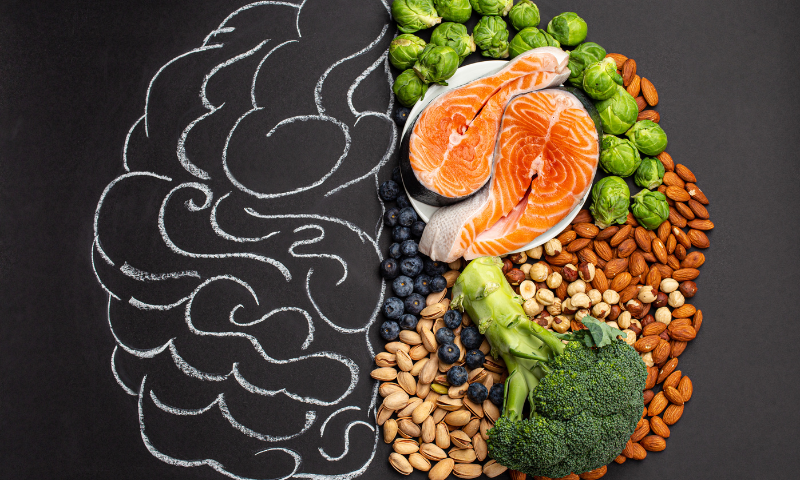As we observe Brain Awareness Week from March 11-17, it’s important to shed light on holistic approaches to maintaining and improving brain health. Central to this is understanding how our lifestyle choices, such as diet, stress management and physical activity, can impact the wellbeing of our brain.
Here are some brain health tips to help you nurture a healthy brain this week and beyond!
Nutrition and the Brain
Good nutrition plays a crucial role in supporting a healthy brain. Essential nutrients like Omega-3 fatty acids and antioxidants are vital for cognitive function and brain health. A balanced diet that includes fruits, vegetables, whole grains and healthy fats can support brain function and reduce the risk of cognitive decline.
- Omega 3s: Omega-3 fatty acids, found in fish, flaxseeds and walnuts, are essential for cognitive function. Studies have shown that omega-3s can improve memory and reduce the risk of developing Alzheimer’s disease.
- Whole Grains: Whole grains like oatmeal, brown rice and quinoa provide necessary carbohydrates and energy for the brain, along with B vitamins that support brain function.
- Antioxidants: Antioxidants found in blueberries and dark chocolate protect the brain from oxidative stress, aiding in the aging process, and can improve memory, cognitive function, and reduce the risk of Alzheimer’s disease. Adding fruits and vegetables to every meal and snack can help ensure an adequate intake of antioxidants.
Stress Management for Cognitive Resilience
Stress is an inevitable part of life, but chronic stress can be detrimental to brain health, leading to memory loss and cognitive decline. Techniques for managing stress include mindfulness meditation, deep-breathing exercises and yoga. These practices not only reduce stress but also improve brain function by enhancing concentration and mental stamina.
- Mindfulness Practice: Engaging in daily mindfulness exercises such as mindful walking or eating can help reduce stress and increase mental acuity. Try to fully focus on the present moment and observe the sensations and details of the current activity without judgment.
- Guided Meditation: Incorporate guided meditation sessions into your routine by using a meditation app or online videos. Start with brief intervals, extending the sessions into longer periods to deepen mental relaxation and cognitive rejuvenation.
- Breath Work Techniques: Mastering various breath work techniques like the 4-7-8 method or alternate nostril breathing can help manage acute stress responses and promote a calm and focused mind.
Physical Activity: A Pillar of Brain Health
Exercise is a powerful tool for supporting brain health. Regular physical activity can improve cognitive functions such as memory and problem-solving abilities, and it encourages the production of neurotrophic factors, which aid in maintaining and growing new neural connections. Whether it’s a jog in the park, a dance class or weight training, finding an activity you enjoy is key to making exercise a consistent part of your life.
- Set Achievable Goals: Start with small, realistic goals to increase physical activity, such as a 10-minute walk daily. Gradually increase the time as you feel more comfortable. Reaching these goals can provide a sense of accomplishment and motivate you to continue improving.
- Incorporate Movement into Your Routine: Look for opportunities to be more active throughout the day, such as taking the stairs instead of the elevator or walking or cycling to work. Small changes can make a big difference in your overall levels of physical activity.
- Join a Group or Class: Group activities like exercise classes, sports teams or hiking clubs can offer social encouragement and a commitment structure that helps maintain regular physical activity. Engaging with others who share similar fitness goals can help motivate you and give you a sense of community.
Brain Awareness Week serves as a reminder of the importance of lifestyle choices in nurturing our brains. Embrace this week as a starting point to make long-term changes that benefit your cognitive health, seeking professional advice as needed, especially when it comes to supplements. Your brain is the command center for all you do; caring for it through proper nutrition, stress management and physical activity is an investment in your quality of life!






